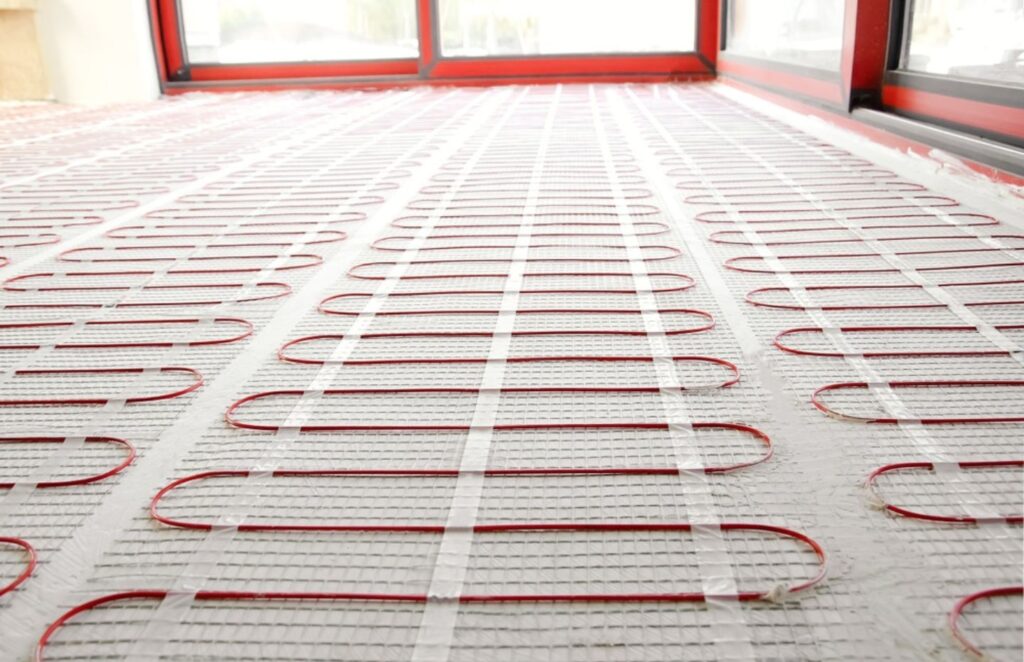- Sign-In
- Sign-Up
Electric underfloor heating has become an increasingly popular method for heating homes.
The residential electric underfloor heating market in the USA has risen from $245 million in 2016 to $350 Million in 2024, an increase of 43% in only 8 years.
But is it the right choice for you?
This comprehensive guide explores the pros and cons of electric underfloor heating, helping you make an informed decision.

Electric underfloor heating is often more energy-efficient than traditional heating systems.
Unlike radiators that heat air, underfloor systems distribute heat evenly across the floor, reducing the amount of energy required to maintain a comfortable temperature.
With no radiators to accommodate, electric underfloor heating frees up space, offering more room for furniture and design elements.
This advantage is particularly beneficial in smaller spaces.
Electric underfloor heating is versatile, and compatible with various floor coverings including tile, wood, and even carpet, providing flexibility in interior design.
Rooms heated by underfloor systems retain heat longer due to the thermal mass of the floor.
This results in a consistently warm environment with heat that stays longer, unlike the fluctuating temperatures and faster cooling common with traditional heating.
Radiant heat is just like the heat from the sun and is much more comfortable than forced air heating systems.
The even distribution of heat from the ground up ensures a comfortable, equal living environment, eliminating cold spots and drafts often associated with conventional heating systems.
Electric underfloor heating can improve air quality by reducing the circulation of dust and allergens, making it a healthier choice, especially for those with respiratory issues.
Electric underfloor heating is a more environmentally friendly option, often using less energy and reducing carbon emissions compared to traditional heating methods.
They are also compatible with solar and other renewable energy sources enabling your home to become truly net zero.
Installing electric underfloor heating can significantly increase the value of your property, making it an attractive feature for potential buyers.
Unlike hydronic underfloor heating systems, electric systems have no mechanical parts or components that require ongoing maintenance or servicing. Fewer parts = fewer chances of anything going wrong.
Underfloor heating runs without creating any noise at all, unlike furnaces or boilers with ducts or radiators.

The initial setup cost of electric underfloor heating can be higher than traditional heating systems, especially in existing properties where floors may need to be raised or replaced.
The installation process can be time-consuming, particularly in renovations where existing floors must be removed and reinstalled.
Installing electric underfloor heating typically requires professional expertise to ensure safe and efficient operation, adding to the overall cost.
Installation may impact the height of your floors, potentially requiring adjustments to doors and fixtures.
Consider your specific requirements, such as the size of the area, existing heating systems, and insulation levels.
Installing electric underfloor heating is often more suitable for new constructions or major renovations.
If you are thinking of electric underfloor heating for just a single room, like a bathroom, it might be worth considering an electric heating panel as a more affordable alternative.
While the initial investment is significant, the long-term energy savings can be substantial, particularly if you currently use, or plan to convert to, renewable energy sources such as solar.
Evaluate the potential energy savings against the upfront costs to determine if it’s a financially viable option for you.
Electric underfloor heating systems are well known for being robust and reliable heating systems given their innately resilient design and lack of components that could potentially fail or suffer any damage.
On rare occasions, electric underfloor heating systems can experience issues such as thermostat failures or wire damage.
Typically, electric underfloor heating systems can last up to 30 years, and sometimes much longer, making them a sound long-term investment for your home.
Heated floors offer comfort and energy efficiency, but the value depends on your circumstances, including climate, house insulation, and budget.
Generally speaking, and you can and should research this yourself, people who have replaced more traditional heating systems with underfloor heating much prefer their new heating system and are happy they made the right decision.
A common regret is people only installing it in one room, but wishing they had it installed throughout their entire home.
Electric underfloor heating offers numerous benefits such as energy efficiency and comfort. However, the initial costs and installation complexities must be considered.
By weighing these pros and cons, you can determine if electric underfloor heating is a suitable investment for your home.
So long as you do not find the cost or installation process prohibitive, the benefits of electric underfloor heating far outweigh any potential disadvantages.
If you think electric underfloor heating would be a great way to improve your home and would like to discuss your options we are here to help. Get in touch today.
